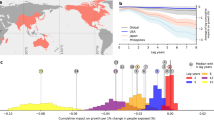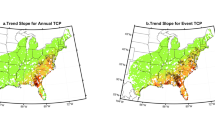Abstract
Warming of the climate system and its impacts on biophysical and human systems have been widely documented. The frequency and intensity of extreme weather events have also changed, but the observed increases in natural disaster losses are often thought to result solely from societal change, such as increases in exposure and vulnerability. Here we analyse the economic losses from tropical cyclones in the United States, using a regression-based approach instead of a standard normalization procedure to changes in exposure and vulnerability, to minimize the chance of introducing a spurious trend. Unlike previous studies, we use statistical models to estimate the contributions of socioeconomic factors to the observed trend in losses and we account for non-normal and nonlinear characteristics of loss data. We identify an upward trend in economic losses between 1900 and 2005 that cannot be explained by commonly used socioeconomic variables. Based on records of geophysical data, we identify an upward trend in both the number and intensity of hurricanes in the North Atlantic basin as well as in the number of loss-generating tropical cyclone records in the United States that is consistent with the smoothed global average rise in surface air temperature. We estimate that, in 2005, US$2 to US$14 billion of the recorded annual losses could be attributable to climate change, 2 to 12% of that year’s normalized losses. We suggest that damages from tropical cyclones cannot be dismissed when evaluating the current and future costs of climate change and the expected benefits of mitigation and adaptation strategies.
This is a preview of subscription content, access via your institution
Access options
Subscribe to this journal
Receive 12 print issues and online access
$259.00 per year
only $21.58 per issue
Buy this article
- Purchase on Springer Link
- Instant access to full article PDF
Prices may be subject to local taxes which are calculated during checkout

Similar content being viewed by others
References
, Topics Geo—Natural Catastrophes 2013: Analyses, Assessments, Positions (Munich RE, 2014); http://www.munichre.com/site/wrap/get/documents_E236640509/mram/assetpool.mr_america/PDFs/3_Publications/Topics_Geo_2013_us.pdf.
Botzen, W. J. W. Managing Extreme Climate Change Risks through Insurance (Cambridge Univ. Press, 2013).
Bouwer, L. M. Have disaster losses increased due to anthropogenic climate change? Bull. Am. Meteorol. Soc. 92, 39–46 (2011).
Mohleji, S. & Pielke, R. Reconciliation of trends in global and regional economic losses from weather events: 1980–2008. Nat. Hazards Rev. 15, 04014009 (2014).
Pielke, R. et al. Normalized hurricane damage in the United States: 1900–2005. Nat. Hazards Rev. 9, 29–42 (2008).
Crompton, R. P., McAneney, K. J., Chen, K., Pielke, R. A. & Haynes, K. Influence of location, population, and climate on building damage and fatalities due to Australian bushfire: 1925–2009. Weath. Clim. Soc. 2, 300–310 (2010).
Barredo, J. I. No upward trend in normalised windstorm losses in Europe: 1970–2008. Nat. Hazard Earth Sys. 10, 97–104 (2010).
Barredo, J. I. Normalised flood losses in Europe: 1970–2006. Nat. Hazard Earth Sys. 9, 97–104 (2009).
Choi, O. & Fisher, A. The impacts of socioeconomic development and climate change on severe weather catastrophe losses: Mid-Atlantic region (MAR) and the U. S. Climatic Change 58, 149–170 (2003).
Downton, M., Miller, J. & Pielke, R. Reanalysis of U.S. National Weather Service flood loss database. Nat. Hazards Rev. 6, 13–22 (2005).
Barthel, F. & Neumayer, E. A trend analysis of normalized insured damage from natural disasters. Climatic Change 113, 215–237 (2012).
Nordhaus, W. D. The economics of hurricanes and implications of global warming. Clim. Change Econ. 01, 1–20 (2010).
Katz, R. W. Discussion on ‘Predicting losses of residential structures in the state of Florida by the public hurricane loss evaluation model’ by S. Hamid et al. Stat. Methodol. 7, 592–595 (2010).
Smith, A. B. & Katz, R. W. US billion-dollar weather and climate disasters: Data sources, trends, accuracy and biases. Nat. Hazards 67, 387–410 (2013).
Chavas, D., Yonekura, E., Karamperidou, C., Cavanaugh, N. & Serafin, K. U. S. hurricanes and economic damage: Extreme value perspective. Nat. Hazards Rev. 14, 237–246 (2013).
Handmer, J. et al. Managing the Risks of Extreme Events and Disasters to Advance Climate Change Adaptation 231–290 (IPCC, Cambridge Univ. Press, 2012).
Pielke, R. A. & Landsea, C. W. Normalized hurricane damages in the United States: 1925–95. Weather Forecast. 13, 621–631 (1998).
Box, G. E. & Cox, D. R. An analysis of transformations. J. Roy. Stat. Soc. B Met. 26, 211–252 (1964).
Landsea, C. W. & Franklin, J. L. Atlantic hurricane database uncertainty and presentation of a new database format. Mon. Weath. Rev. 141, 3576–3592 (2013).
Landsea, C. W. et al. A reanalysis of the 1931–43 Atlantic hurricane database. J. Clim. 27, 6093–6118 (2014).
McAdie, C., Landsea, C., Neumann, C. J., David, J. E. & Blake, E. S. Tropical Cyclones of the North Atlantic Ocean, 1851–2006: With 2007 and 2008 Track Maps Included (US Department of Commerce, National Oceanic and Atmospheric Administration, National Weather Service, National Environmental Satellite, Data, and Information Service, 2009).
Pielke, R. A. & Landsea, C. N. La Niña, El Niño and Atlantic hurricane damages in the United States. Bull. Am. Meteorol. Soc. 80, 2027–2033 (1999).
Katz, R. W. Stochastic modeling of hurricane damage. J. Appl. Meteorol. 41, 754–762 (2002).
Efron, B. & Tibshirani, R. J. An Introduction to the Bootstrap Vol. 57 (CRC Press, 1994).
Emanuel, K. Increasing destructiveness of tropical cyclones over the past 30 years. Nature 436, 686–688 (2005).
Knutson, T. R. et al. Tropical cyclones and climate change. Nature Geosci. 3, 157–163 (2010).
Webster, P. J., Holland, G. J., Curry, J. A. & Chang, H.-R. Changes in tropical cyclone number, duration, and intensity in a warming environment. Science 309, 1844–1846 (2005).
Schmidt, S., Kemfert, C. & Höppe, P. Tropical cyclone losses in the USA and the impact of climate change—A trend analysis based on data from a new approach to adjusting storm losses. Environ. Impact Assess. Rev. 29, 359–369 (2009).
Holland, G. J. & Webster, P. J. Heightened tropical cyclone activity in the North Atlantic: Natural variability or climate trend? Phil. Trans. R. Soc. A 365, 2695–2716 (2007).
IPCC Climate Change 2013: The Physical Science Basis (eds Stocker, T. F. et al.) (Cambridge Univ. Press, 2013).
Holland, G. J. Hurricanes and rising global temperatures. Proc. Natl Acad. Sci. USA 109, 19513–19514 (2012).
Estrada, F., Perron, P. & Martínez-López, B. Statistically derived contributions of diverse human influences to twentieth-century temperature changes. Nature Geosci. 6, 1050–1055 (2013).
Grinsted, A., Moore, J. C. & Jevrejeva, S. Projected Atlantic hurricane surge threat from rising temperatures. Proc. Natl Acad. Sci. USA 110, 5369–5373 (2013).
Acknowledgements
We thank L. Bouwer for his comments on previous versions of this paper.
Author information
Authors and Affiliations
Contributions
F.E., W.J.W.B. and R.S.J.T. designed the study, analysed the data and wrote the paper. These authors contributed equally to the study. All authors discussed the results and commented on the manuscript.
Corresponding author
Ethics declarations
Competing interests
The authors declare no competing financial interests.
Supplementary information
Supplementary Information
Supplementary Information (PDF 2888 kb)
Rights and permissions
About this article
Cite this article
Estrada, F., Botzen, W. & Tol, R. Economic losses from US hurricanes consistent with an influence from climate change. Nature Geosci 8, 880–884 (2015). https://doi.org/10.1038/ngeo2560
Received:
Accepted:
Published:
Issue Date:
DOI: https://doi.org/10.1038/ngeo2560
This article is cited by
-
When don’t we need a new extreme event attribution study?
Climatic Change (2023)
-
Increasing typhoon impact and economic losses due to anthropogenic warming in Southeast China
Scientific Reports (2022)
-
Climate Disasters and the Macroeconomy: Does State-Dependence Matter? Evidence for the US
Economics of Disasters and Climate Change (2022)
-
Declining vulnerability but rising impacts: the trends of climatic disasters in Nepal
Regional Environmental Change (2022)
-
Double benefit of limiting global warming for tropical cyclone exposure
Nature Climate Change (2021)



